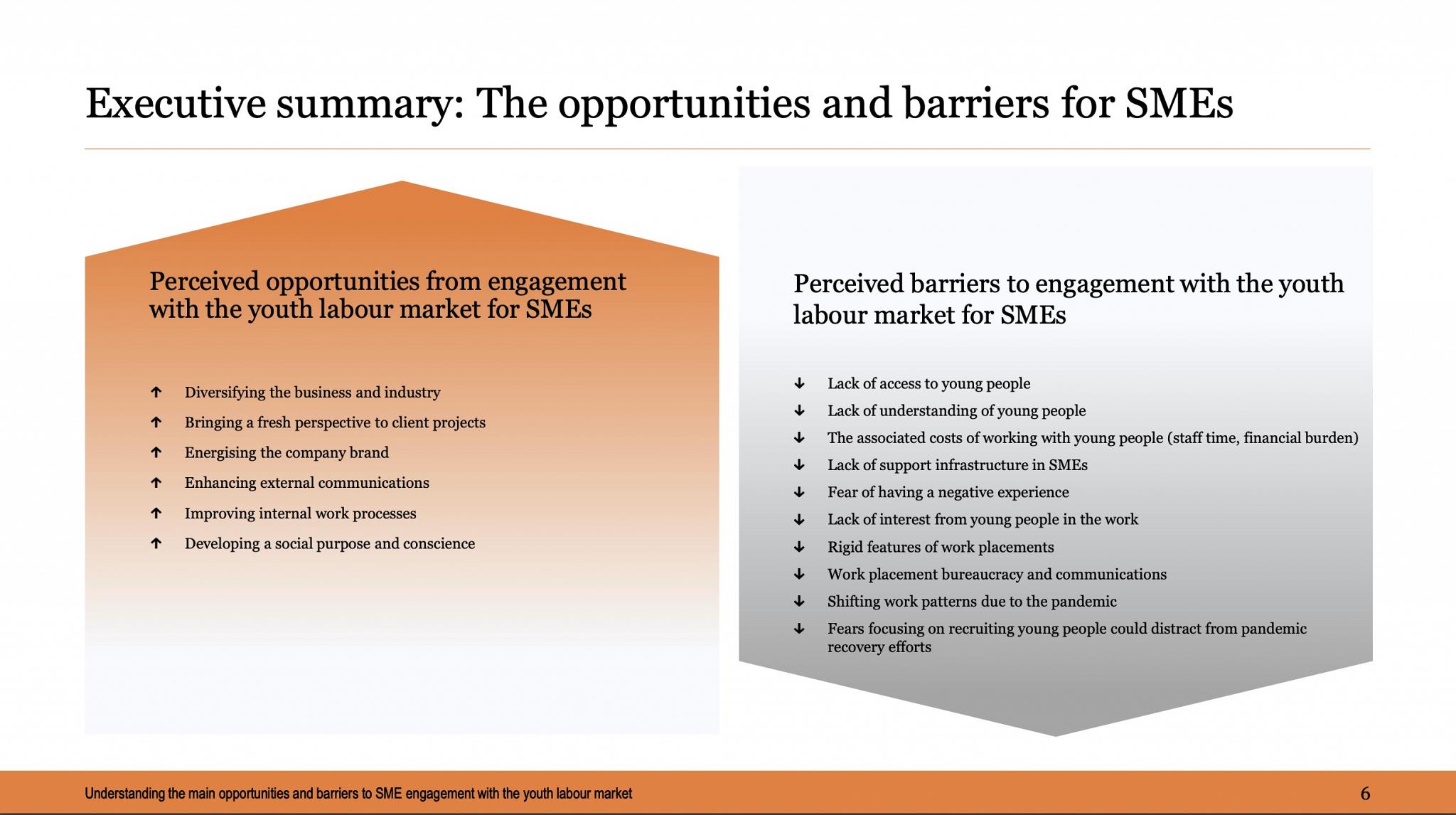Insights into small businesses and youth employment prospects
Primary page content
A new report on understanding the youth labour market has suggested ways that small and medium enterprises can overcome perceived barriers and work with young people to improve their economic prospects.

A Goldsmiths study of small and medium-sized enterprises (SMEs) based in South East London has identified the opportunities and barriers to engaging with young people and suggests what SMEs, intermediaries responsible for arranging work placement opportunities, and policymakers can do to facilitate SME engagement with the youth labour market.
The report, entitled ‘Understanding the main opportunities and barriers to SME engagement with the youth labour market’ draws on the results of a longitudinal interview-based study of 20 SMEs and their perspective on and experience with young people.
The research was led by Dr Rachel Doern, Reader in Entrepreneurship at the Institute of Management Studies at Goldsmiths, and commissioned by the independent charity EY Foundation (EYF) that supports young people from low-income backgrounds get paid work experience, employability, skills training and career guidance.
Dr Doern’s research generally focuses on entrepreneurship, barriers to business growth and management practices during crises. On the study’s findings she comments: “In speaking with SMEs owners, I was rather struck by the overwhelmingly positive attitudes they had towards working with young people, and the firmness of their beliefs that young people could add value to businesses.
“At the same time, the reality for many of these SMEs was that their direct experience of working with young people was limited to small numbers, and few employed young people from low-income backgrounds specifically."
SMEs compromise more than 90 per cent of businesses globally and in the UK, they make up 99 per cent of the business population and three-fifths of employment. The research provides insight into the interaction between SMEs and the youth labour market (age 16-24).
The report, published on October 28, 2022, presents the results of a longitudinal-based study of 20 SMEs in South East London conducted in 2021 and 2022 during the COVID-19 pandemic.
The study identified six perceived opportunities from engagement with the labour youth market for SMEs, and 10 perceived barriers that stand in the way.
The perceived opportunities were:
- Diversifying the business and industry
- Bringing fresh perspectives to client projects
- Energising the company brand
- Enhancing external communications
- Improving internal work processes
- Developing a social purpose and conscience
The perceived barriers were:
- Lack of access to young people
- Lack of understanding of young people
- The associated costs of working with young people relating to finances and staff time
- Lack of support infrastructure in SMEs
- Fear of having a negative experience
- Lack of interest from young people in the work
- Rigid features of work placements
- Work placement bureaucracy and communications
- Shifting work patterns due to the pandemic
- Fears focusing on recruiting young people could distract from pandemic recovery efforts

The report indicates that while SMEs are destinations for young people, a number of perceived barriers stand in the way of these businesses engaging more fully with young people. Improving employment prospects for young people will depend on addressing these barriers and exploiting the opportunities and the report makes a number of recommendations for how this can be achieved in each case.
Goldsmith alumnus Will Wordell is the co-founder of marketing agency The Park, a small business which has worked with consumer brands from H&M to DreamWorks since launching five years ago.
The Park is working with the EY Foundation, to support young people entering the workplace from low-income backgrounds. Co-founder Will believes that the opportunities that come from youth employment “massively outweigh” the barriers.
He said: “Young people are the lifeline of our industry, for me, there is always a great focus on getting young people into the business, I think they can take the company in really exciting directions."
Will believes that the biggest obstacle for SMEs engaging with young people is the associated financial costs. He said: “As a small business what’s hard is balancing revenue and resource, bigger companies can probably balance those things a bit easier. There are lots of benefits for small businesses, but the resource and financial point of view can make things quite challenging.”
On working with the EY Foundation, Will added: "One of our three founding values is ‘Diversity Makes the World Better’, so it's fantastic to partner with the EY Foundation to act on this belief. Young people from diverse backgrounds are the future of our industry and we have a responsibility to provide the opportunities, support and access they deserve. But it's a responsibility that is a pleasure when you meet such interesting and talented young people."
Jodie McNally, Interim CEO of the EY Foundation said: “It’s great to see that SMEs want to work with young people and to also see an acknowledgement of the energy and insight a more diverse talent pool can contribute to every workplace. This report showcases the benefits of – and perceived barriers to – working with young people, providing a basis for SMEs to come together to close the gap between wanting to engage with the youth labour market and actively employing young people.”
The report recommends that policymakers can work on designing youth employment support programmes that are more attractive to SMEs, helping SMEs access said programmes and supporting intermediaries working with young people and SMEs.
Dr Doern contends that youth employment programmes should prioritise small businesses: “It is my belief that by investing more in SMEs and the role they play in youth employment we can significantly improve employment prospects for young people as a whole and the operating position of small businesses simultaneously.
“For too long there has been an over-reliance on large businesses with the infrastructure and processes already in place to support young people at work. Young people and SMEs may be missing out on valuable opportunities that can come from working more closely together. Designing youth employment programmes that are better suited to SMEs, that take in to account their unique features, challenges and potential, will yield long-term rewards.”